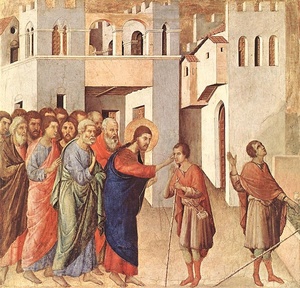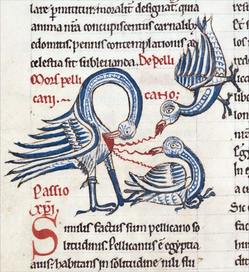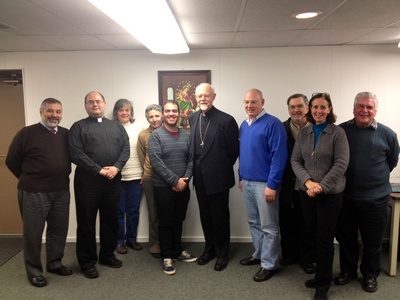 An annual Mass is celebrated for the repose of the soul of Father Luigi Giussani (+February 22, 2005) and the good of the Fraternity of Communion and Liberation. We are a small but faithful group of friends who help each other to follow Christ and love the Church; we live our Baptism.
An annual Mass is celebrated for the repose of the soul of Father Luigi Giussani (+February 22, 2005) and the good of the Fraternity of Communion and Liberation. We are a small but faithful group of friends who help each other to follow Christ and love the Church; we live our Baptism.
Confession: Celebration of mercy, not trial before prosecution
“As confessors we are called to show mercy and
hope, to be fathers more than judges, to take on the penitent’s pain and listen
with much patience,” Cardinal Raymond Burke told CNS correspondent Carol Glatz.
A Hope that is Stronger than the Recession
The Italian daily Il Avvenire published a story by Giorgio Paolucci, “A Hope that is Stronger than the Recession,” an interview with the President of Communion and Liberation, Father Julián Carrón.
“Today, too, a new beginning is therefore necessary to testify to how reason and freedom find their fulfillment in faith, making evident that Christianity is something that is humanly worth our while. In this sense, the Year of Faith is directed first of all to Christians, but, in the degree to which we live a ‘new beginning,’ it can benefit everyone, according to the method chosen by Jesus: give the grace to some so that through them it can reach everyone who is open to accepting it.”
The Jesus mandate vs. Obama’s mandate –the challenge of religious freedom
10 million of the poor, the needy, and the suffering throughout our nation.
Catholic Charities doesn’t know how many of those served were not
Catholic, because they simply never ask. Our faith compels us to serve, not the
faith of those we help.
creed, class, and gender as Jesus Christ, their founder. That any one of them,
much less all of them, should be forced to choose between the Gospel mandate
and the U.S. government’s health care mandate strikes at the very heart of the
right to religious liberty on which our country was founded.
CT Catholics to fight Department of Health and Human Services on conscience rights
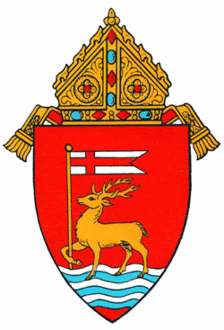 We cannot comply with this edict. Our parents and
We cannot comply with this edict. Our parents and
grandparents did not come to these shores to help build America’s cities and
towns, its infrastructure and institutions, its enterprise and culture, only to
have their posterity stripped of their God-given rights. In generations past,
the Church has always been able to count on the faithful to stand up and
protect her sacred rights and duties. We hope and trust that she can count
on this generation of Catholics to do the same. Our children and grandchildren
deserve nothing less.
Ukrainian Diocese of Stamford, will be joining us in the Archdiocese of
Hartford as we mount a campaign against this horrific development. Prayer
and fasting are, of course, supremely important, that wisdom and justice may
prevail and religious liberty may be restored. You may also wish to visit www.usccb.org/conscience
to learn more about this severe assault on religious liberty, and how to
contact our Senators and Representatives to support legislation that would
reverse the Administration’s decision.
edict. It affects the lifeblood of Catholics and millions more who are not
Catholic but whom we serve diligently. The future of all of us and our
country as well is at stake.
Pope shows us that “True authority is humble service in love”
The homilies and brief Angelus talks of the Pope really set the stage for what we ought to pay attention to in our spiritual life. His thinking is clear, and germane. Today is no different. How is it that we recognize and live within the authority of Jesus?
Jesus, on the Sabbath day, as he preached at the synagogue at Capernaum, the
small town where Peter and his brother Andrew lived on the lake of Galilee. In
his teaching, which arouses the wonder of the people, following the liberation
of “a man with an unclean spirit” (v. 23), who recognizes in Jesus as
the “saint of God,” that is, the Messiah. In a short time, his fame
spread throughout the region, which he travels announcing the Kingdom of God
and healing the sick of all kinds: word and deed. St. John Chrysostom observes
how the Lord “alternates the speech for the benefit of those who listen,
moving on from wonders to words and again passing from the teaching of his
doctrine to miracles” (Hom. on Matthew 25, 1: PG 57, 328).
Continue reading Pope shows us that “True authority is humble service in love”
Obama’s breach of faith over contraceptive ruling
One of Barack Obama’s great attractions as a
presidential candidate was his sensitivity to the feelings and intellectual
concerns of religious believers. That is why it is so remarkable that he
utterly botched the admittedly difficult question of how contraceptive services
should be treated under the new health care law.
this decision not once but twice. In the process, Obama threw his progressive
Catholic allies under the bus and strengthened the hand of those inside the
Church who had originally sought to derail the health care law.
be so surprising if Obama had presented himself as a conventional secular
liberal. But he has always held himself to a more inclusive standard.
deservedly celebrated 2006 speech on religion and
American public life was a deeply sophisticated and carefully
balanced effort to defend the rights of both believers and nonbelievers in a
pluralistic republic.
graduation in 2009 was another tour de force. His visit to South
Bend was highly controversial among right-wing Catholics. Yet his address
temporarily silenced many of his critics because it showed an appreciation for
the Catholic Church’s contributions to American life — particularly through its
vast array of social-service and educational institutions — and an instinctive
feeling for Catholic sensibilities.
The priority renewal of the faith
The full body of the Congregation for the Doctrine of the Faith met with the Pope on Friday, 27 January, to discuss his conviction that no other work of the Church, particularly this congregation, takes precedence to the work of evangelization. Everyone ought to be committed “to bringing God back into this world and to opening to all men access to the faith.”
Benedict see now as the opportune moment “to point out to all the gift of faith in the Risen Christ, the clear teaching of the Second Vatican Council and the invaluable doctrinal synthesis offered by the Catechism of the Catholic Church.” Recently, the Pope said that “we are facing a profound crisis of faith, a loss of religious meaning which constitutes the greatest challenge to the Church” (Message for World Mission Day).
Other things that concern us, the Pope noted were:
1. the unity among Christians: maintaining “coherence in the ecumenical task with the Second Vatican Council and the whole of Tradition”;
2. warned of the dangers of “a shallow moralism”;
3. to promote “the logic” contained in the conciliar teaching: “the sincere search for the full unity of all Christians is a dynamism animated by the Word of God”;
4. a need for a “discernment between Tradition with a capital letter and the traditions”: “There exists,” he said, “a spiritual wealth in the different Christian confessions, which is an expression of the one faith and gift to share” (reflecting the recent work done for the full communion of Anglicans).
The last concern of Benedict was that the entire Church speak with one voice with Peter.
Saint Thomas Aquinas
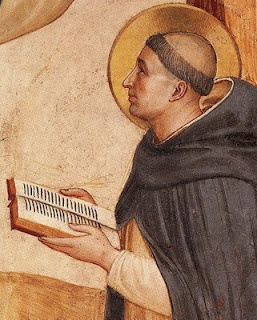 O God, who made Saint Thomas Aquinas outstanding in his zeal for holiness and his study of sacred doctrine, grant us, we pray, that we may understand what he taught one imitate what he accomplished.
O God, who made Saint Thomas Aquinas outstanding in his zeal for holiness and his study of sacred doctrine, grant us, we pray, that we may understand what he taught one imitate what he accomplished.
Pelicanus
PELICANUS is the word for a certain breed of bird
Who truly is a crane;
Egypt is his domain.
There are two kinds there-of;
Near to the Nile they live;
One of them dwells in the flood, the fishes are his food;
The other lives in the isles on lizards, crocodiles,
Serpents and stinking creatures, and beasts of evil nature.
In Greek his title was Onocrotalos, which is longum rostrum,
Said in the Latin tongue instead,
Or long break in our own.
Of this bird it is known that when he comes to his young,
They being grown and strong,
And does them kindly things,
And covers them with his wings.
The little birds begin fiercely to peck at him;
They tear at him and try to blind their father’s eye.
He falls upon them then and stays them with great pain,
Then goes away for a spell, leaving them where they fell.
On the third day he returns, and thereupon he mourns,
Feeling so strong a woe to see the small birds so
That he strikes his breast with his beak until the blood shall leak.
And when the coursing blood spatters his lifeless brood,
Such virtue does it have
That once again they live.
Know that this pelican signifies Mary’s Son:
The little birds are men restored to life again by that dear blood
Shed for us by our God.
Now learn one morning more, revealed by holy lore:
Know why the small birds try to peck thie father’s eye,
Who turns on them in wrath and puts them all to death.
Men who deny the light would blind God’s blazing sight,
But on such people all His punishment will fall.
This is the meaning I find:
Now bear it well in mind.
— from an Anglo-Norman Bestiary of 1120 by Philippe de Thaun;
this version from “Things of this World” by Richard Wilbur


